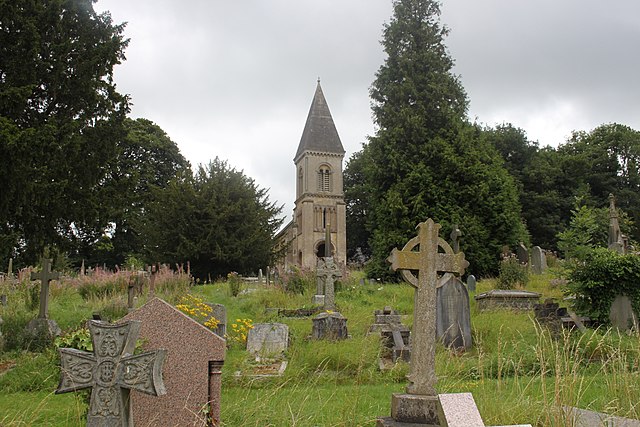Bath Abbey Cemetery
Cemetery in Bath and North East Somerset, UK From Wikipedia, the free encyclopedia
Cemetery in Bath and North East Somerset, UK From Wikipedia, the free encyclopedia
Seamless Wikipedia browsing. On steroids.
Every time you click a link to Wikipedia, Wiktionary or Wikiquote in your browser's search results, it will show the modern Wikiwand interface.
Wikiwand extension is a five stars, simple, with minimum permission required to keep your browsing private, safe and transparent.
The Anglican Bath Abbey Cemetery, officially dedicated as the Cemetery of St Peter and St Paul (the patron saints that Bath Abbey is dedicated to), was laid out by noted cemetery designer and landscape architect John Claudius Loudon (1783–1843) between 1843 and 1844 on a picturesque hillside site overlooking Bath, Somerset, England.

The cemetery was consecrated on 30 January 1844. It was a private Anglican cemetery financed by W. J. Broderick, Rector of Bath Abbey.
The layout is a mixture of formal and informal arranged along a central avenue. It features a mortuary chapel, designed by Bath City Architect G. P. Manners in the then fashionable Norman Revival architectural style.[1]
The cemetery is on a site that was used for Roman burials, three stone coffins and Roman coins dating to Constantine the Great and Carausius having been found when the roadway to the chapel was constructed.[2] In 1952 a further Roman coffin was discovered during the removal of a tree root from a footpath.[3][4]
The eccentric William Thomas Beckford was originally buried here, but moved when his former retreat of Lansdown Tower came under threat of becoming a pleasure garden and was transformed into Lansdown Cemetery in the parish of Walcot. "The best monuments are slightly neo-Grecian with canopied tops, dating from the 1840s. Note that to S. M. Hinds d.1847 signed Reeves, the Bath firm of Monumental masons, that flourished from c.1778 to 1860…."[1]
The cemetery and mortuary chapel are Grade II* listed.[5][6][7] 37 monuments in the cemetery are Grade II or II* listed.[8][9] A general trend is that the most elaborate monuments belong to individuals formerly residing at the most exclusive addresses. An interesting trend seems that clerics get Gothic Revival style monuments and military men typically get Greek Revival style monuments.[1]
The Roman Catholic Perrymead Cemetery is adjacent to Bath Abbey Cemetery.[10][11]
The three-bay double-height chapel was built in 1844 to designs by George Phillips Manners in the Norman Revival architectural style with a prominent west tower over a three-sided open porch / porte cochere. The chapel is built above a crypt and was planned to be flanked by open cloister wings containing a columbarium and loculi. Ever since the cemetery's closure, the chapel has also been closed and is in a deteriorating condition.[1] It was listed Grade II historic building on 5 August 1975,[7] but is now Grade II* listed.[6] It remains owned by Bath Abbey, although a lease or sale was considered to Bath's Orthodox church, which never materialized.
The cemetery contains 3 Commonwealth service war graves of World War I, registered and maintained by the Commonwealth War Graves Commission – a British Army Captain, a Canadian soldier and a Royal Air Force airman.[16]